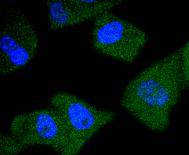Prostate specific antigen (PSA), also designated γ-seminoprotein, seminin, p30 antigen, semenogelase, and kallikrein 3 (KLK3), was first identified as a glycoprotein in human seminal plasma. PSA was determined by sequence similarity to be a member of the kallikrein subfamily of trypsin proteases. PSA is a serine protease that hydrolyzes the major human seminal protein, the seminal plasma mobility inhibitor precursor, or semenogelin I (SPMIP or SgI), which leads to semen liquification. PSA production and expression are highest in normal, benign hyperplastic and cancerous tissues of the prostate, although PSA has also been detected in accessory male sex glands and in breast cancer. PSA has been identified as an aid in the early detection of prostate cancer and is a commonly used tumor marker.


